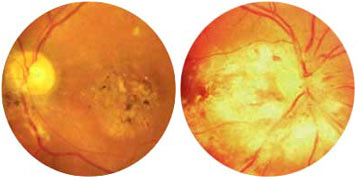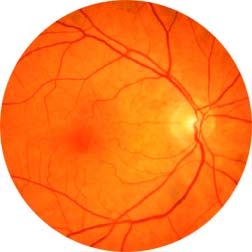| |
Cytomegalovirus
The cytomegalovirus (CMV) is related to the herpes
virus and is present in almost everyone. Normally the immune system is
able to fight the virus, preventing it from causing problems in their
bodies. However, when the immune system is suppressed because of disease
(HIV), organ or bone marrow transplant, or chemotherapy, the CMV virus
can cause damage and disease to the eye and the rest of the body.

Photographs of retinas affected with CMV retinitis
CMV is
the most common type of virus that infects those who are HIV positive.
It affects the eye in about 30% of the cases by causing damage to the
macula. This is called CMV retinitis. The likelihood of developing CMV
retinitis increases as the CD4 cell count decreases.

Normal (unaffected) retina
CMV retinitis may affect one eye at first,
but usually progresses to both eyes and becomes worse as the patient's
ability to fight infection decreases. The virus is sight threatening and
usually requires the care and treatment of a vitreo-retinal surgeon.
Patients with CMV retinitis are at risk of retinal detachment,
hemorrhages, and inflammation of the retina that can lead to permanent
loss of vision and even blindness.
SIGNS AND SYMPTOMS
CMV
retinitis usually causes symptoms, but not always. Patients with a
condition that suppresses the immune system should watch for the
following eye symptoms while under the care of a physician.
•Floaters (spots, bugs, spider webs)
•Light flashes
•Blind spots
•Blurred vision
•Obstructed areas of vision
•Sudden decrease of
vision
DETECTION AND DIGNOSIS
Most patients with CMV retinitis are
referred for eye treatment by another physician. The vitreo-retinal
surgeon diagnoses CMV retinitis by thoroughly examining the back of the
eye using ophthalmoscopy. Fluorescein angiography may be needed to
evaluate the circulatory system of the retina.
TREATMENT
When
managing CMV retinitis, the goal of the doctor is to slow the
progression of the disease and to treat related eye problems. Anti-viral
medications such as ganciclovir or foscarnet are often prescribed. These
drugs can be administered orally, intravenously, injected directly into
the eye or through an intravitreal implant
|
|
The McMann Eye Institute is a comprehensive ophthalmology practice
offering a full spectrum of vision correction and treatment services.